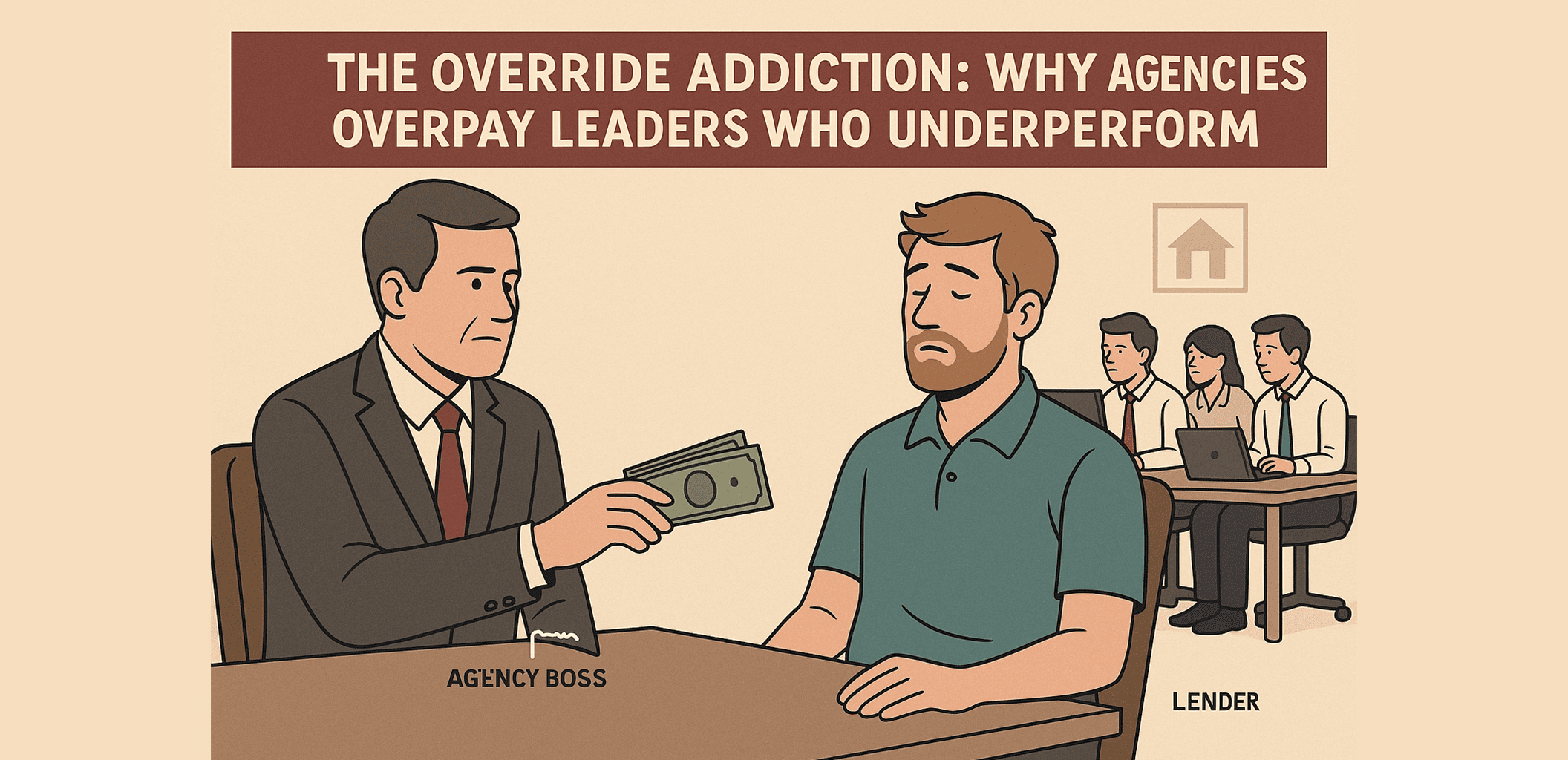The Override Addiction: Why Agencies Overpay Leaders Who Underperform

Principal Lisa noticed a troubling pattern. Every time a new agent joined Team Alpha, they’d be gone within six months. Yet, she was still paying Team Alpha’s leader a 15% override on all their transactions. She was effectively rewarding him for running a revolving door.
This is the reality of override addiction—a financial trap where agencies overpay leaders who have stopped leading.
The Logic Behind Overrides
Overrides were designed as a leverage tool. Instead of one principal managing 50 agents directly, team leaders carry part of the load. In return, they receive a slice of their downline’s commissions—commonly 5% to 20%.
Done right, overrides incentivize leaders to:
- Recruit new negotiators.
- Provide training and coaching.
- Retain and support agents.
- Act as a cultural bridge between agents and principals.
But too often, agencies end up paying for titles, not results.
The Problem: Paying for Titles, Not Results
-
Leaders Who Stop Leading
Many “leaders” stop recruiting and stop coaching once their group is established. They collect overrides as passive income, while their agents survive on their own. -
Deadweight Overrides
Overrides become a fixed cost, even when the leader hasn’t contributed in years. Principals end up funding a “ghost salary” for someone who isn’t driving growth. -
Toxic Loyalty Loops
Sometimes principals tolerate underperforming leaders because they fear losing the agents under them. The result: a leader holds the agency hostage while doing little to justify the payout. -
Recruitment Without Retention
Some leaders are great at bringing people in, but terrible at keeping them. They still collect overrides on churned agents while principals waste money and energy restarting recruitment.
Why Agencies Get Addicted
-
Fear of Conflict
Cutting someone’s override feels like starting a war. Principals worry about mass resignations if the leader walks. -
Short-Term Thinking
Many agencies prioritize quick recruitment wins. Overrides look like a fast way to grow headcount, even if long-term value is questionable. -
Lack of Systems
Without transparent KPIs or data, it’s hard to measure whether a leader is truly adding value—or just coasting.
The Real Cost of Override Addiction
Override addiction isn’t just about wasted money. It creates deeper damage:
-
Demoralized Performers
When a top producer closes a RM2 million deal and sees a large chunk go to a leader who provided no support, their question is simple: “Why am I working so hard?” -
Distorted Culture
The message becomes: politics pays more than performance. Agents quickly learn that loyalty to a leader’s politics matters more than actual contribution. -
Stunted Growth
Money that could be reinvested in marketing, systems, or better lead generation instead disappears into deadweight overrides.
Breaking the Cycle: Smarter Override Structures
- KPIs Beyond Recruitment: Overrides should depend on retention, training outcomes, and team performance—not just recruitment.
- Time-Boxed Overrides: Pay higher overrides in the first year, then taper down unless the leader proves consistent contribution.
- Transparent Data Dashboards: Track churn, lead response times, and coaching participation. If the numbers don’t add up, overrides adjust automatically.
- Re-Qualify Leaders Annually: Being a leader shouldn’t be permanent. Re-certify leadership roles based on contribution, not seniority.
- Align with Systems, Not Politics: With ERPs like ListingMine, override rules can be automated, audited, and linked to performance data. This removes the fear-driven, discretionary element.
Quick Self-Assessment for Principals
Ask yourself:
- What percentage of your override payments go to leaders who haven’t recruited anyone in the last year?
- Do you have clear, measurable KPIs that a leader must hit to justify their override?
- If a top-performing agent complained about their leader’s lack of support, could you prove the leader was adding value?
- Are overrides tied to team growth and retention, or just titles and headcount?
- Would your agency survive if you cut unproductive overrides tomorrow?
Final Word: Pay for Value, Not for Titles
Overrides can be powerful when leaders genuinely drive growth. But when agencies get addicted to paying for underperformance, overrides turn into a financial black hole.
The cure isn’t to kill overrides—it’s to tie them to real value: recruitment, retention, coaching, and culture. Because the question isn’t “Who has the title?” but “Who is building the business?”











































































































